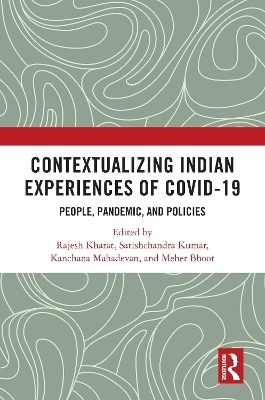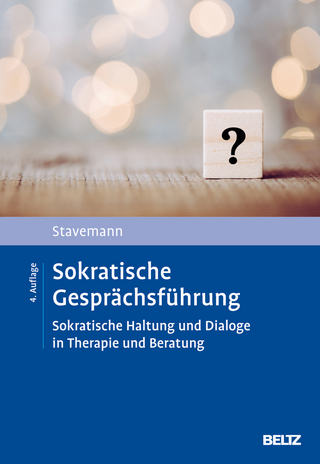
Contextualizing Indian Experiences of Covid-19
Routledge India (Verlag)
978-1-032-29185-7 (ISBN)
This volume captures the social, political, psychological, administrative, and policy dimensions of the COVID-19 pandemic in the Indian context. The book is divided into four parts. Part I highlights social narratives from underprivileged workers, ASHA workers, the LGBTIQ+ community, and sanitary workers. It documents their struggles to develop mitigation, adaptation, and resilience strategies. Part II includes case studies and stories of self-management, the mental health of students from rural and urban Maharashtra, and of caregivers. It unveils the path of transformation of self to deal with the issues of anxiety and emotional turmoil caused during and due to the COVID-19 pandemic. Part III consists of resilience, philosophical hope, and solidarity, which reflect the contribution of seva by the Sikh community. It also highlights the contribution of government organizations like Indian Railways, Air India, and the Employee Provident Fund Organization to provide relief to both the people of India and Indians residing abroad to bring people back to the country during the unprecedented times. Part IV discusses the responses of various states of India to the COVID-19 pandemic and the implementation of policies by the government of India during those times.
Based on empirical research work, this book will be useful for students, teachers, researchers, behavioral scientists, and practitioners of psychology, sociology, human geography, mental health, political science, public health, and public policy. This book will also be of interest to policymakers and the general public to understand the intricacies involved and the essential propositions with regard to pandemics.
Rajesh Kharat is Professor and former Chairperson of the Centre for South Asian Studies, School of International Studies, JNU, and former Chief Advisor of EOO, JNU, New Delhi. He also served as Dean of Humanities at the University of Mumbai from 2019 to 2022 (on Deputation); he has an MA in Political Science from the University of Pune and an M.Phil. and Ph.D. from the Centre for South Asian Studies, SIS, JNU, New Delhi and LLB from University of Mumbai. He began teaching at the Department of Civics and Politics, University of Mumbai, in 1991, and has continued at JNU, New Delhi, since 2008. He is the recipient of the Latin American Council for Social Sciences, Argentina, and spent two months in Cuba in 2005. He has authored, edited, and co-edited 15 books and over 30 research papers. He has completed five major research projects in India and abroad on themes related to contemporary South Asia. As a Dean, he established the School of International Relations and Strategic Studies (SIRSS) at the University of Mumbai in 2021 and became the first Director of the SIRSS. He has also initiated three research online journals at the University of Mumbai and was Honorary Editor of Sambhāṣaṇ, an interdisciplinary humanities online journal of the University of Mumbai. He was also a visitor’s representative at the Executive Council of Mahatma Gandhi Central University, Bihar. Satishchandra Kumar is Professor and Head at the Department of Applied Psychology & Counselling Centre, University of Mumbai. He is also the former Coordinator of the Mahatma Gandhi Peace Centre. He received a Summer Fellowship from the Albert Ellis Institute in New York. He has also received a scholarship to undergo supervised training in the Enneagram Professional Training Programme from Helen Palmer Model San Francisco, USA. He was also awarded Research Fellowship by the Indian Council of Social Science Research (ICSSR), New Delhi. He has published in international peer-reviewed journals like the Journal of Personality and Social Psychology, Psychological Science, and British Journal of Guidance and Counselling. He has contributed to Sage’s volume Eminent Indian Psychologists: 100 Years of Psychology in India. He has published over 50 research papers in national and internationally renowned journals. Apart from research publications, some edited books include Beyond the Ordinary: Stories that Inspire and Challenge and Some Outstanding Women of India. His research interest is industrial/organizational psychology, which provides for positive psychology, engagement at the workplace, and stress and coping. He is a reviewer in various international journals. He is also editor of Sambhāṣaṇ, an interdisciplinary humanities online journal of the University of Mumbai. Kanchana Mahadevan is Professor at the Department of Philosophy, University of Mumbai. She has held visiting professorships at LUISS University, Rome (2016, 2019), and Leopold Franzens University, Innsbruck (2023). She has also been a senior fellow at the Justicia Amplificata, Goethe University Frankfurt and Bad Homburg (2018) and the Moore Institute, National University of Ireland, Galway (2019). She teaches and researches feminist philosophy, continental thought, critical theory, and political philosophy. She also works in the interdisciplinary areas of aesthetics and film. Her book Between Femininity and Feminism: Colonial and Postcolonial Perspectives on Care (DK Printworld and ICPR, 2014) examines the relevance of Western feminist philosophy in the Indian context while bringing Western feminism into dialogue with its Indian counterpart. Her publications on Ambedkar explore his re-articulation of democracy from the Indian perspective. In her recently published research papers on care ethics, she has explored its critical potential in relation to health work and the cosmopolitan character of care. She is the former editor of Sambhāṣaṇ, an interdisciplinary humanities online journal of the University of Mumbai. Meher Bhoot is a Professor at the Department of German, University of Mumbai. Her areas of specialisation are German Literature with a focus on Literature of German Minorities, Postcolonial Studies, and Culture Studies, and her areas of interest are European cultural history and European history of art. She is an active member of the German Institutes Partnership with the Universities of Göttingen and Freiburg in Germany. Under the aegis of this partnership, she was Guest Professor at the Department of Intercultural German Studies, University of Göttingen, Germany, in 2017. She has been a DAAD Fellow since 2004 and received the Rotary Cultural and Ambassadorial Scholarship (1997–98). Apart from her published articles, some co-edited volumes include Revisiting Günter Grass, Voices from India and Germany, Interkulturelle Momente, Einfach menschlich. She has also co-edited textbooks for short courses on teaching Marathi to nonnative speakers, including Communicative Marathi for Nurses, Communicative Marathi for Rickshaw and Taxi Drivers, Communicative Marathi for Government Officials, and Communicative Marathi for Bank Employees. She has recently authored a book in German entitled Nicht Herkunft, sondern Dasein: Kulturelle Identität im Werke Rafik Schamis / Not Origin, but Existence: Cultural Identity in the Works of Rafik Schami (Würzburg: Könighausen & Neumann, 2023). She is the former co-editor of Sambhāṣaṇ, an interdisciplinary humanities online journal of the University of Mumbai.
List of Figures xii List of Tables xiii List of Contributors xiv Preface xix Introduction 1 RAJESH KHARAT AND SATISHCHANDRA KUMAR PART I Narratives From Social Peripheries 9 1 The Unprivileged Migrant Workers in India at the Time of COVID-19 11 AMIT RANJAN 2 The Forgotten Warriors: ASHA Workers in the COVID-19 Pandemic 28 APARNA PHADKE, SATISHCHANDRA KUMAR, AND SUMAN PUJARI 3 Voices from the Margins: Pandemic Experiences of the LGBTIQ Community in Mumbai 44 SHAILESH BHUTKA, KAJAL BORASTE, AND SUNIL GANGAVANE 4 Sanitary Workers in Mumbai Metropolitan Region During the COVID-19 Pandemic 61 NIKHIL VILAS GAWAI AND APARNA ASHOK PHADKE 5 Epistemological Crisis of Performing Theater in Times of COVID-19 82 OMKAR BHATKAR PART II Mental Health and the COVID-19 Pandemic 97 6 Rational Self-Management in the COVID-19 Pandemic 99 ANJALI JOSHI 7 The COVID-19 Pandemic and Rumor: The Indian Story 112 BRAJ BHUSHAN 8 Creative Responses to the COVID-19 Pandemic: Shared Stories of Disabled Young People, Caregivers, and Mental Health Practitioners from Mumbai, India 123 JILL SANGHVI AND JEHANZEB BALDIWALA 9 Mental Health of Students of Higher Education in Maharashtra During the COVID-19 Pandemic: A Preliminary Study 135 JUHI DESHMUKH, B.R SHEJWAL, SATISHCHANDRA KUMAR, DAVE SOOKHOO, ABHIJEET CHORE, AND SHWETA SAHASRABUDDHE PART III The COVID-19 Pandemic: Resilience and Setbacks 151 10 Tears, Resilience, and a Pandemic: A Visual (Semiological) Journey 153 RASHMI LEE GEORGE 11 Air India’s Response to the COVID-19 Pandemic 166 SEEMA RAWAT 12 Finding Hope and Solidarity Through Camus and Derrida During COVID-19 178 BIRAJ MEHTA RATHI 13 EPFO to e-EPFO: Transformational Journey of a Service 194 MRIDULA GHAI, NILENDU MISHRA, AJAY KUMAR, AND GHAZALA ALI KHAN 14 The Concept of Seva in Sikhism and Its Relevance in the COVID-19 Pandemic 208 RAVINDER KAUR CHEEMA 15 The Role of Indian Railways During COVID-19: An Appraisal 226 PRAVEEN KUMARI SINGH AND SAGAR CHAHAR PART IV Indian States’ Responses to the COVID-19 Pandemic 245 16 COVID-19 and the Politics of Lockdowns in Kashmir 247 SHAKHOOR AHMAD WANI 17 Conducting Bihar Assembly Elections 2020 during the COVID-19 Pandemic 260 JEETENDRA KUMAR 18 Public Education in Times of COVID-19 274 PRAVEEN KUMARI SINGH AND VASUNDHRA SINGH 19 COVID-19 in Arunachal Pradesh: An Overview 291 CHAPHIAK LOWANG 20 Sikkim’s Response to COVID-19: The Fight Continues 304 CHUNKU BHUTIA 21 Understanding Kerala’s Social Model of COVID-19 Containment: Perspectives from Below 320 P R REHNAMOL 22 Government of India’s Policies to Face the COVID-19 Challenges in Education, Economy, and Health Sectors 334 ARUSHI SHARMA AND AISHE DEBNATH Index 355
| Erscheinungsdatum | 02.08.2024 |
|---|---|
| Zusatzinfo | 12 Tables, black and white; 20 Line drawings, black and white; 10 Halftones, black and white; 30 Illustrations, black and white |
| Verlagsort | London |
| Sprache | englisch |
| Maße | 156 x 234 mm |
| Gewicht | 880 g |
| Themenwelt | Geisteswissenschaften ► Psychologie ► Allgemeine Psychologie |
| Geisteswissenschaften ► Psychologie ► Sozialpsychologie | |
| Sozialwissenschaften ► Ethnologie | |
| Sozialwissenschaften ► Soziologie ► Makrosoziologie | |
| Sozialwissenschaften ► Soziologie ► Spezielle Soziologien | |
| ISBN-10 | 1-032-29185-0 / 1032291850 |
| ISBN-13 | 978-1-032-29185-7 / 9781032291857 |
| Zustand | Neuware |
| Haben Sie eine Frage zum Produkt? |
aus dem Bereich


